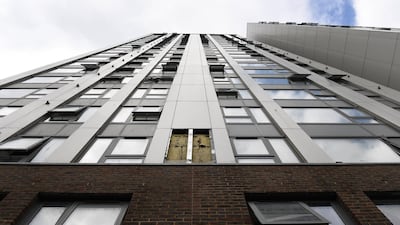Living in high-rise housing that has failed cladding similar to that of Grenfell Tower, the residential tower block in west London that caught fire in 2017 and killed 72 people, is taking a significant toll on tenants’ mental health, a new report found.
Seven in ten residents polled have expressed worries that the exterior materials could pose a threat and one quarter have sought medical treatment for anxiety. An estimated 40,000 people living in the UK are living in housing blocks that are fitted with material deemed inadequate by regulations.
The survey released by the UK Cladding Action Group revealed that, out of the 196 affected lease holders surveyed across the country, 69.5 per cent feel anxious or worried on a daily basis and 25.5 per cent have received medical attention due to the mental trauma, with 15.3 per cent now on medication. A 8.7 per cent reported suicidal feelings as a direct result of the crisis.
Figures released by the government in early April. 16,600 homes across 163 private residential buildings are covered in aluminium composite material (ACM), which was banned in the aftermath of the fire, which destroyed many communities and shone a light on government austerity policies.
Across the UK, many freeholders have been refusing to pay for the improved cladding, which has been adding to the mental health burden of tenants.
In the anonymised survey, 92.3 per cent of respondents said they had money worries, 84.7 per cent said they felt unsupported by the government and 61.7 per cent said they had worries about their own or family members’ safety.
One respondent said they felt “neglected by local and national politicians”, adding that there was some genuine sympathy and concern but “zero action”. The person said the politicians know that leaseholders are already paying thousands of pounds each to be able to continue living in dangerous homes, deeming it “an absolute scandal and disgrace”.
“I genuinely believe nothing will be done until we have a second tragedy in a private block - hopefully that won't be my block when I'm in it but who knows - it is a constant fear,” the person said. “If I could sell my flat even by breaking even or having a small loss I would - but the reality is I cannot and will not be able to sell it until the cladding is replaced. In the meantime I live in danger - unable to progress any of my life aspirations.”
Many respondents said that they felt consistently anxious, stressed and depressed, with one saying that they wake up every night “worrying about everything”.
Another leaseholder said: “[This] has been the worst 21 months of my life. I am struggling to get through each day. Gone is the enjoyment of life.”
Others said that living in a tower block that didn’t feel safe impacted their relationships and job prospects.
An inquiry by the British government’s own equalities watchdog that concluded this spring found that the local authorities and state bodies “knew or ought to have known” that their management of Grenfell Tower was breaching rights to life and adequate housing.

